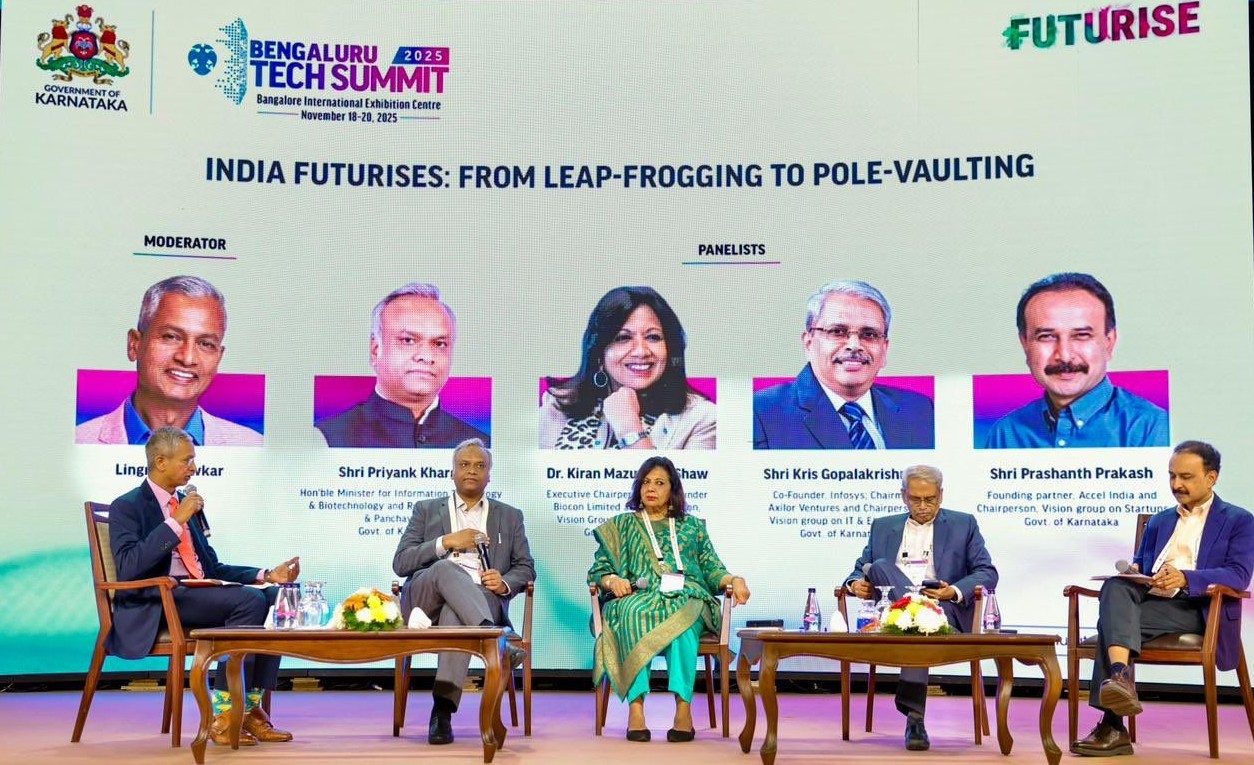Karnataka Pushes Global Partnerships at Bengaluru Tech Summit 2025
Karnataka is framing its next decade as one driven by global partnerships, distributed innovation, frontier technologies and new regional hubs that take the state’s tech advantage far beyond its traditional strengths.
Topics
News
- Altman’s AI Energy Comparison to Human Development Draws Flak
- Why Open Networks, DPIs Are Key to Scaling Social Impact
- Anthropic Expands Claude Into Code Security With AI Reasoning
- IBM Expands GovTech Push in India With Lucknow AI Center
- Tata Communications, RailTel Partner to Upgrade Network for AI Era
- Microsoft Taps Asha Sharma to Lead Gaming as Spencer Retires

Karnataka used the second day of the Bengaluru Tech Summit 2025 to sharpen its pitch as a global innovation hub, with state minister for information technology and biotechnology Priyank Kharge steering a full slate of meetings on cross-border collaboration, deeptech growth and the state’s expanding data-center footprint.
Kharge chaired the Global Innovation Alliance (GIA) country roundtable, bringing together envoys and representatives from more than 20 partner nations. The discussions focused on using Karnataka’s digital public infrastructure and startup ecosystem as a platform for cross-border collaboration, including soft-landing programs, talent partnerships and sector-specific corridors spanning AI, telecom, cybersecurity, biotech, climate tech, mobility and advanced manufacturing.
He underlined that Karnataka now works with over 35 countries through the GIA platform, which the state has built up since 2017 as a vehicle for technology diplomacy and long-term innovation partnerships.
Kharge said the government is preparing to expand soft-landing facilities, including plug-and-play workspaces and local support so overseas and out-of-state startups can test and scale in Karnataka, strengthen responsible-AI practices and move from broad intent to “actionable projects,” signalling that the alliance is expected to translate into concrete joint initiatives rather than remain a diplomatic talking shop.
Much of Day 2 built on Tuesday’s opening plenary, “India Futurises: From Leap-frogging to Pole-vaulting,” where Kharge and Vision Group leaders Biocon Ltd Executive Chairperson Kiran Mazumdar-Shaw, Infosys Co-founder and Axilor Ventures Chairman Kris Gopalakrishnan, and Accel India Founding Partner Prashanth Prakash set out Karnataka’s longer-term ambition.
The session traced Bengaluru’s rise from a pensioners’ town to what officials now describe as the world’s fourth-largest tech cluster.
Kharge argued the state has moved beyond its ITES, or information technology enabled services such as call centres and back-office work, toward a role anchored in global R&D and deep-tech innovation, calling for a “DeepTech decade” powered by AI, semiconductors, quantum technologies, space tech, robotics and advanced manufacturing.
He linked that push to decentralizing innovation through the Local Economy Accelerator Programme (LEAP), a ₹1,000-crore initiative to build startup and deep-tech hubs in tier-2 and tier-3 cities beyond Bengaluru, strengthening the talent pipeline and creating blended public–private funding pools for deep-tech ventures across Karnataka, not just in Bengaluru.
A key moment in that plenary was the preview of KEO, an affordable AI-powered personal computing device developed in Karnataka. Kharge and the Vision Group chairs pledged around 1,000 units for deployment in government schools, positioning the device as part of a broader effort to democratize access to AI-enabled learning tools.
Mazumdar-Shaw used her intervention to argue that computational biology is emerging as “the future of biology” globally and said Karnataka’s long-term bets on biotech give it an opportunity to fuse IT and life sciences in ways few regions can match.
She warned, however, that China’s aggressive investments in cutting-edge biosciences have given it a clear advantage, and urged India to commit boldly to AI-led life sciences, calling it an “affordable risk” that the country must be willing to take. She also pressed for India to strive for “biotech sovereignty” by 2047, backed by sovereign genomic databases and large-scale biomanufacturing capacity.
On Day 2, Kharge also chaired a dedicated Data Center Roundtable with industry leaders, developers and cooling and infrastructure specialists. The discussion highlighted Karnataka’s growing role as a hub for both edge and hyperscale facilities and put a particular spotlight on Mangaluru as one of the state’s most promising upcoming data-center locations.
A feasibility report titled “Mangaluru: India’s Next Potential Data Centre Hub” was released and debated at the session, setting out the infrastructure and policy requirements for scaling the coastal city’s capacity.
Participants agreed to create an expert working committee to map industry needs and ecosystem gaps, feeding into the state’s broader data-center roadmap under its 2022–27 policy.






